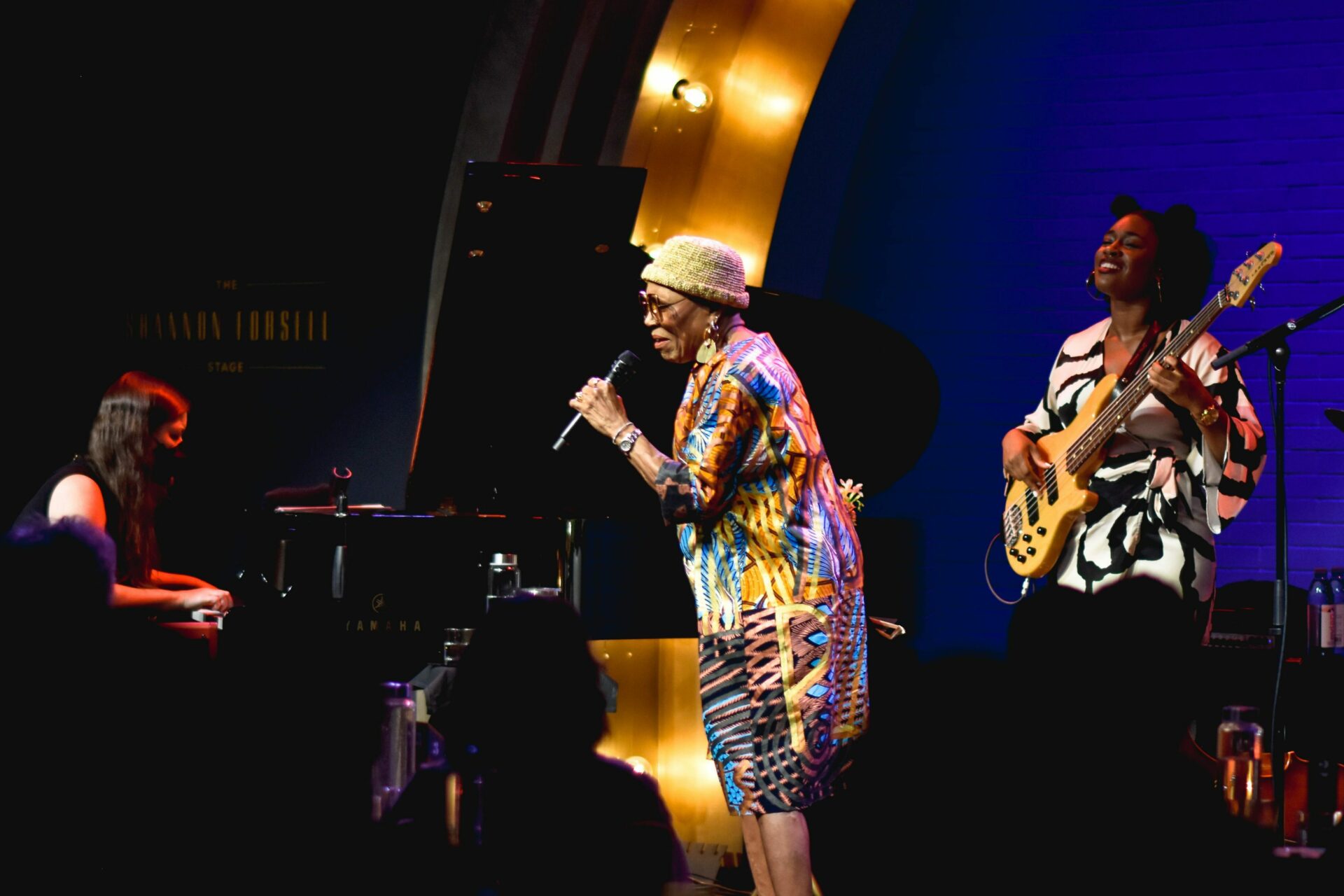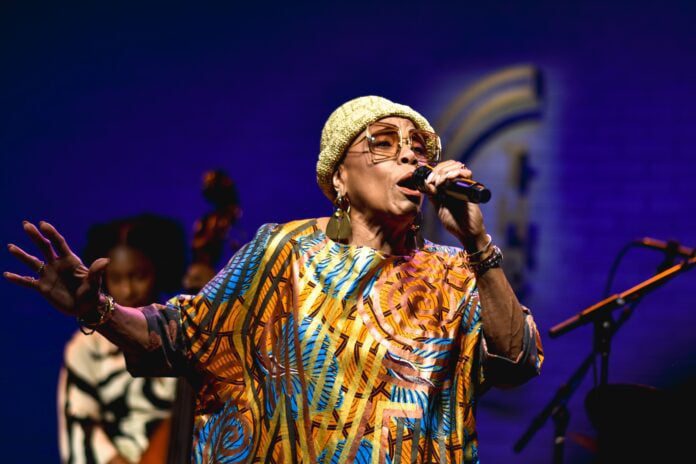Throughout her latest show at The Cabaret, Dee Dee Bridgewater — who has three Grammys, a Tony, the title of Jazz Master by the National Endowment for the Arts and the position of Commanduer within the French government’s Ordre des Arts et des Lettres — morphed the already intimate stage into something of a sanctuary. Turning from singer to sage, she was accompanied by her all-female quartet, We Exist, as she confronted hard to hear truths with charm.
Featuring the likes of the rambunctious yet refined drummer Shirazette Tinnin, the precise yet piercing pianist Carmen Staaf, and the discerning and dynamic bassist Amina Scott, the performance was bound to be memorable. Yet, as I found in my interview with Bridgewater, so much of her artistry extends beyond the auditory.
As she alluded to, her recent return to America has by no means been pleasant. She feels as though she has “gotten bogged down with the U.S.” Such has had a great effect upon her creative practice, with her saying, “I have not felt lead and inspired to write since I’ve been back in the United States.”
Having returned to America to devote her time to caring for her mother amidst the deteriorating effects of dementia, these creative blocks were greatly exacerbated by her passing in 2017. Such a traumatic experience has had her feel as though she’s “just beginning to come out of this kind of numbness.”
Finally reinvigorated, she has found herself deeply upset by what is going on in the country. Indeed, when asked about when such a numbness truly began to cease, she said that it was in part around last October.
“I’m very upset with what’s going on in the world,” Bridgewater said. “I’m livid when people bring up the war in Gaza. It’s genocide but people don’t care.”
She finds that “it’s absolutely crazy where we are” in America, and she’s surely not alone in noticing that “We’re at these new political divides today.” Yet, as she recognizes that “we’re going in circles,” she’s dedicated to stopping the cycle.
It is such that her performance at The Cabaret is one of many that marks a new chapter for her career, one which will surely see her become a Socratic gadfly to an all too gruesome world. For though she said before the start of her songs that she “knows the importance of not bringing politics to the stage,” she truly did “let the music speak for itself”.
Beginning with Roberta Flack’s relaxed rendition of “Trying Times,” she soulfully sang in an almost exacerbated, weary tone about the challenges of our current climate and the confusion caused by our harmful ways. Then, she moved on to a far more personal piece, Nina Simone’s “Mississippi Goddam.” Having spent a considerable amount of time within the South, she sang the song at hand, inspired by the 16th Street Baptist Church Bombing which saw four young Black girls killed by white supremacists and numerous others injured, in an unquestionably impassioned manner.

Lamenting that which Martin Luther King Jr. called “one of the most vicious and tragic crimes ever perpetrated against humanity,” Bridgewater reminded the audience mid-song that Nina Simone wrote the piece in the style of a show tune — a subtle reference to a culture all too quick to cover up racism — and that, we all have scripts to write as we wander about our lives.
Following Simone’s first protest song, Bridgewater then gave an example of exactly what happens when one does not take ownership of oneself and one’s story. Examining specific kinds of stereotypes based around real individuals within the African Diaspora, she began to sing “Four Women” to the sound of cheers and hollers from the audience who assuredly knew the song by heart.
They were in for a treat, however, as though the original piece seeks to portray four skewed portraits of Black ladies, with abundant representations of slavery, alienation, sexual exploitation, and uncompromising bitterness, Bridgewater’s arrangement offered even more details to dissect. A direct pull from her 2007 album “Red Earth,” created in Bamako, the capital city of Mali, the piece had a host of traditional elements, from instruments to expressions.
It arose above the audience where it lingered, truly atmospheric, with certain passages by the bassist Amina Scott even being repeated to the pleasure of Bridgewater, the rest of the band, and the audience at large. Yet she was not alone in her success as, Shirazette Tinnin delicately drummed, almost merely tapping, as she worked to add adornments to the piece. Collectively, the works of these four women worked to show that under the surface of any Black stereotype is a complex human being worthy of compassion.
Yet they did not stop there when it came to telling the truth. For at its root racism, the obscuring of an individual by eyes filled with prejudice, is the direct result of objectification. The quartet’s next song, “Strange Fruit,” was a poignant illustration of precisely what occurs when humanity is neglected in such a way.
In the manner of Bettye LaVette’s arrangement, created after the death of George Floyd, Bridgewater belted out the lyrics with an intensity that saw her body contort amidst the bloodcurdling depiction of cruelty offered by the song’s illustration of a lynching. First recorded by Billie Holiday, the piece was inspired by a poem written by Abel Meeropol after witnessing a lynching in Marion, Indiana — only a car ride away from the audience. Even as they may not have known such a horrifying fact, tears glistened within their candlelit eyes, and applause was a welcome relief.
What followed was, as Dee Dee phrased it, “a mental palette cleanser.”
A poetic piece of her own creation, inspired by instrumentals composed by the accomplished Wayne Shorter, the band began to play the rejuvenating song “Long Time Ago.” Another piece released upon the Red Earth album, it referenced the triumphs of Africans from past to present, showcasing the vibrancy and rich history of the entire diaspora. Singing it, Bridgewater’s voice was filled with all the stark adornments of a sanguine sunset, remarkable and awe-inspiring, yet approachable and filled with the warmness of community.

Following this, and ending the night, was a Puerto Rican rendition of the well-regarded piece “My Favorite Things.” With a quick melody carried on with care by pianist Carmen Staaf, the work was ecstatic, dynamic and the very definition of dazzling.
Both pieces worked to, as Bridgewater stated in our interview, “promote that idea of, this kind of utopian place, that we can at least get to through music.” Though particularly present here, this strand of idealism is inherent in all her songs, and she hopes people approach her work with a similar degree of open-mindedness.
In describing her ideal audience, the type of person she hopes listens to her creations, she made certain parameters quite plain. For she doesn’t desire simply the traditionalist jazz listener, the one who can’t seem to get past the conformity of the genre, the people quick to say, “now that’s not real jazz.”
Indeed, she questions what jazz even is these days, what it needs. Even still, one thing is resoundingly clear to her, that it is a byproduct and catalyst of various forms of freedom. That “someone that is not necessarily into boundaries, or walls, someone that is completely open in life and to life, not bound by any kind of definition of what life is supposed to be about” is the kind of person she hopes takes to her music. For jazz is a gem, the genre of beautiful defiance, and she seeks to give people a refuge for such unconventional and bejeweled thoughts and feelings.
The negative circles and cycles she spoke of prior will surely only be broken by such self-sustaining free-spiritedness, and her performance at The Cabaret made clear a single sincerity: that Black joy is the greatest resistance against racist oppression.
Caiden Cawthon is a legally blind writer who seeks to shine a light on that not readily seen, and can be found on Instagram at @caidencawthon.





